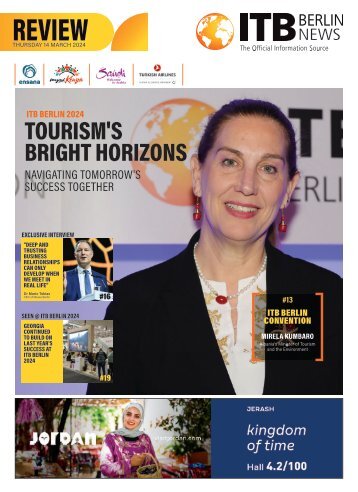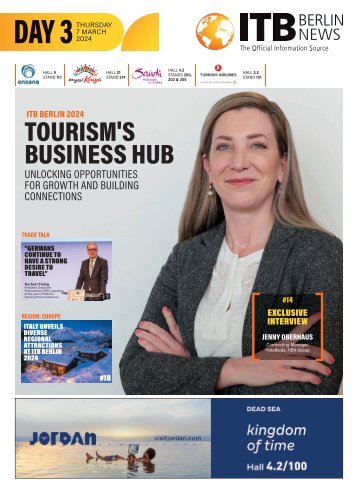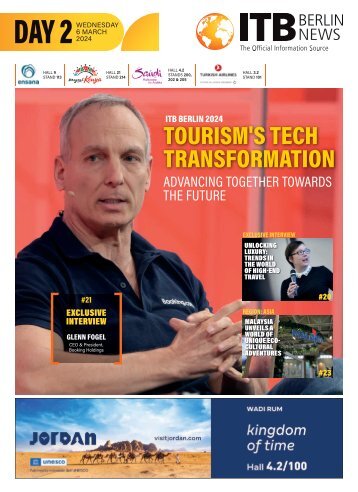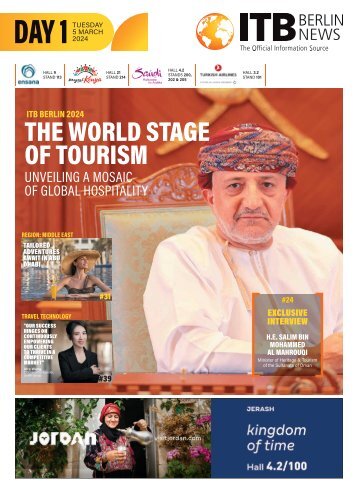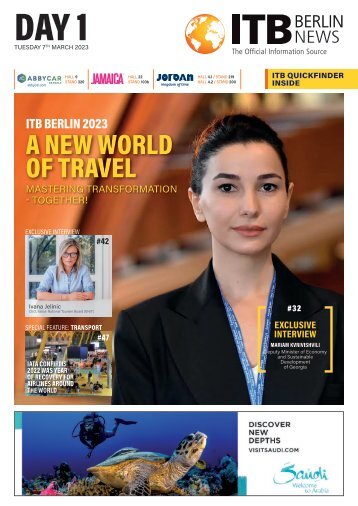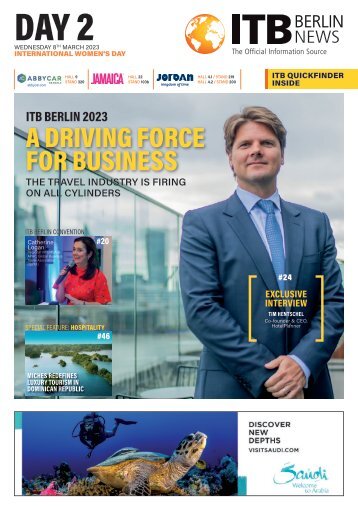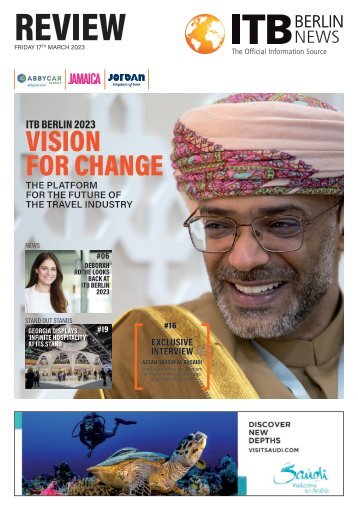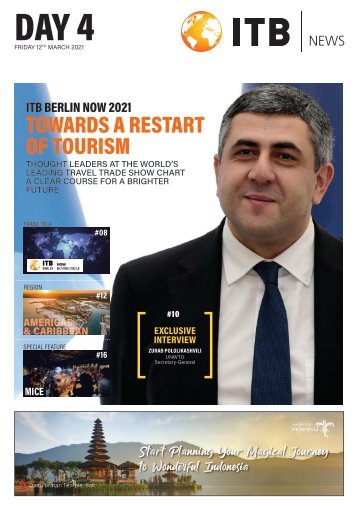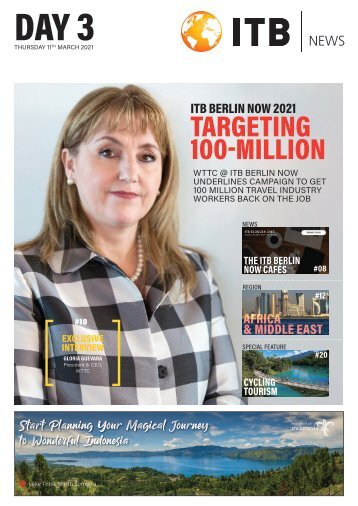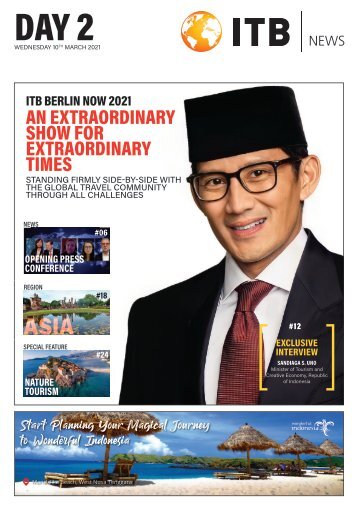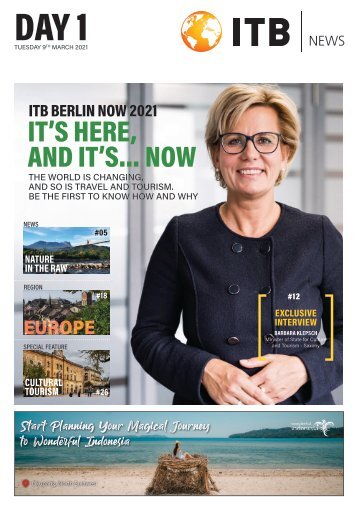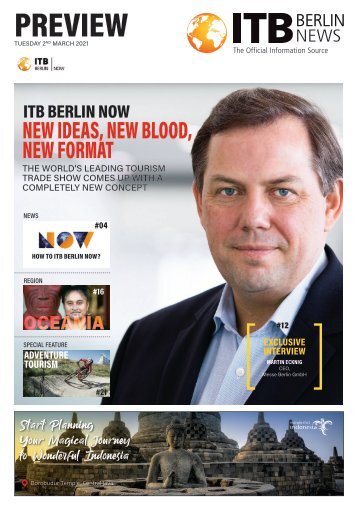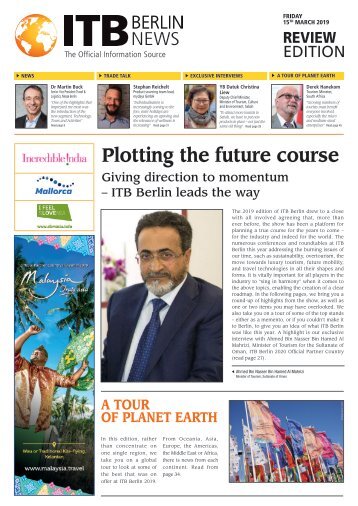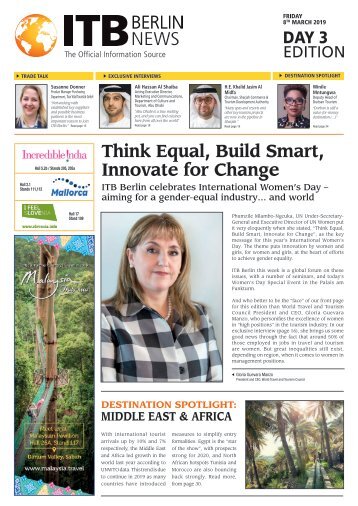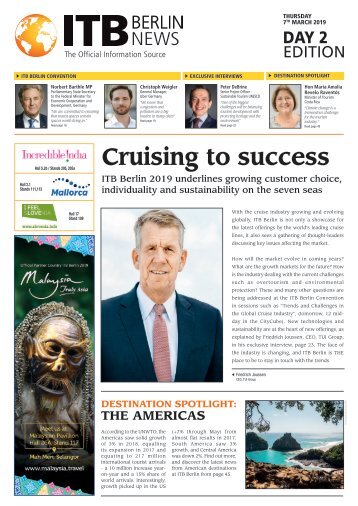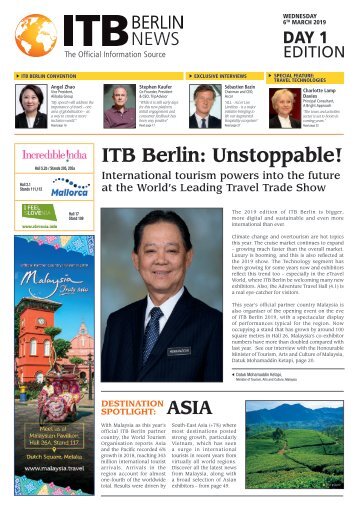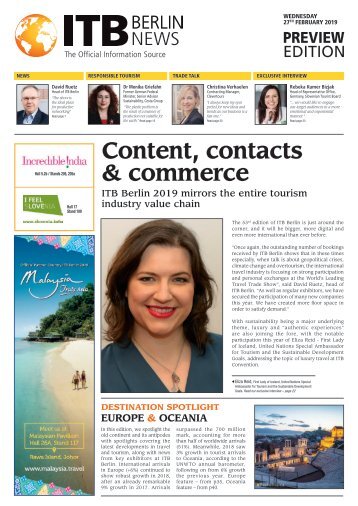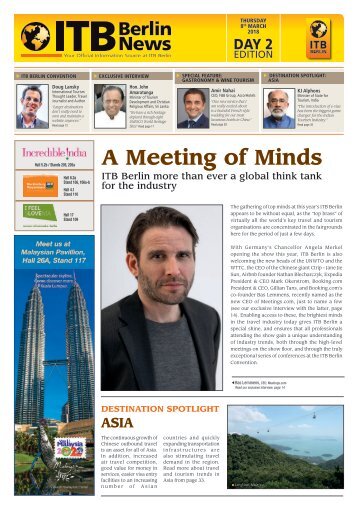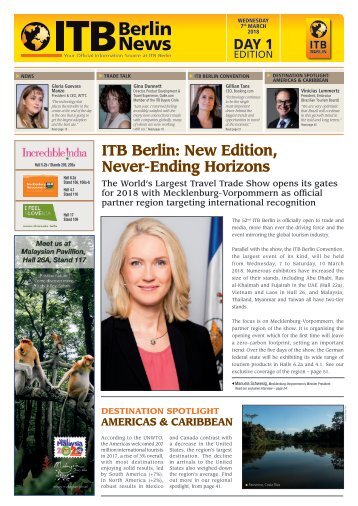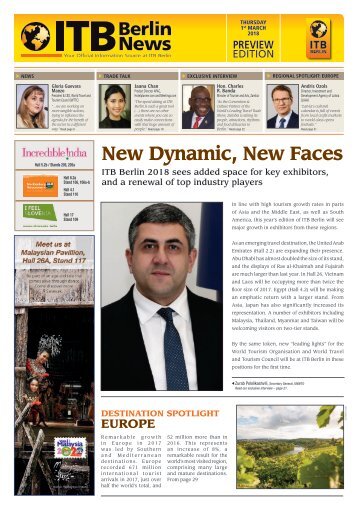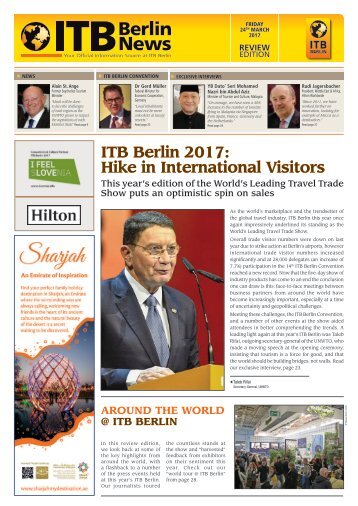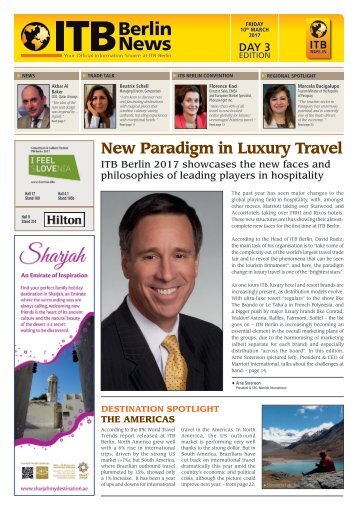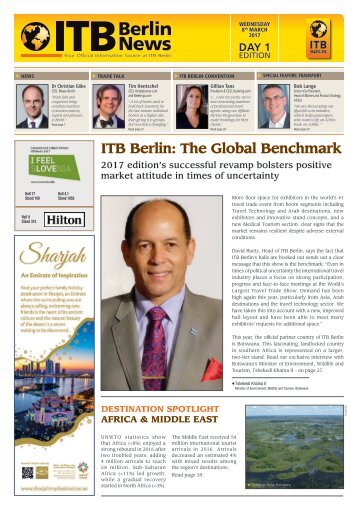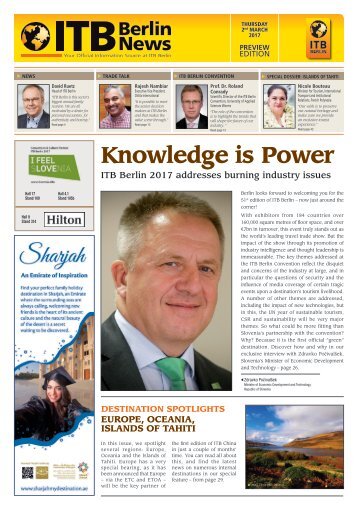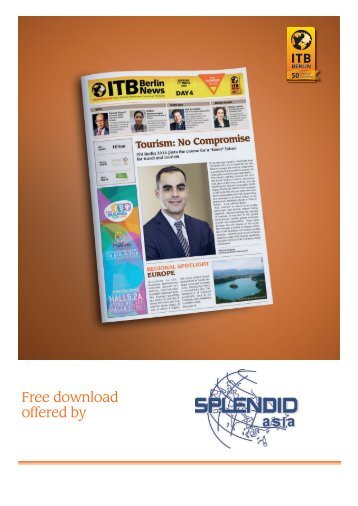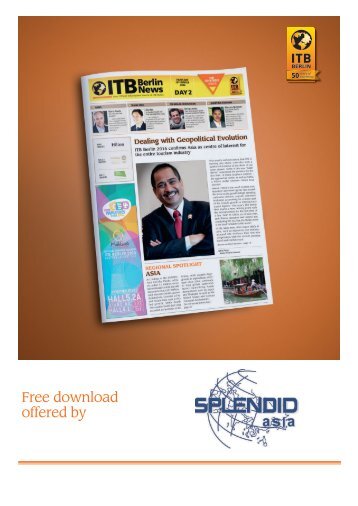
ITB Berlin News Preview Edition
- Text
- Tourism
- Hotels
- Tours
- Berlin
- Resort
- Resorts
- Exhibitors
- Tourismus
- Halle
- Aussteller
- Preview
26 SPECIAL FEATURE
26 SPECIAL FEATURE EDUCATION / TRAINING Career Paths in Tourism Erich Sixt – on “the right attitude for professional success” ITB Career World …the stepping-stone to job success ITB Berlin provides a forum for job-seekers and personnel managers of major tourism companies – with a major support programme featuring panel discussions and papers, a careers advisory service and tips for job applicants. At this year’s ITB Career World, visitors can make direct contact with the personnel managers of leading tourism companies and find out about the latest job vacancies – a perfect chance to move up the career ladder. At the ITB Career World, visitors can benefit from the careers advisory service and from tips for job applicants. The five-day programme of stage events will also have advice on how to plan a career, how to market oneself as well as on mentoring programmes. From 4 to 8 March 2015, those interested can meet the representatives of companies from every sector of the tourism industry as well as prospective employers. On the ITB Career World stage, the personnel managers and COOs of leading tourism companies will be talking about important topics regarding careers and professional training. Thus, on 5 March 2015 at 11 a.m. Jürgen Gangl, chairman of Hoteldirektoren_vereinigung Deutschland (HDV) and the general manager of Park Inn Alexanderplatz will be speaking about “First-class education: the approval seal for outstanding professional training – the benefits to trainees, companies and the industry”. At 11.25 a.m. Michael Albert, chairman of Familotel AG, will be talking about “Careers in family-run businesses – the prospects working for small and medium-sized proprietorowned hotels”. On Friday, 6 March at 11 a.m. Mario Pick, a member of the presidium of the Food & Beverage Management Association (FBMA), and Michael Mücke, COO Accor Hospitality Germany GmbH, will be presenting their new development concept for young professionals in the hospitality industry. At 11.50 a.m. Nicole Kassem, director of Human Resources, Grand Hyatt Berlin, will be showing what the personnel managers of premium international hotel brands need to look out for in applicants. Rounding off events on the topic of careers and training on Sunday, 8 March will be the DEHOGA trade association. During the morning Gerrit Buchhorn, deputy general manager of DEHOGA Berlin, will be talking about careerrelated topics such as the project entitled “Celebrate your strengths”, and will be presenting an online tool for discovering one’s strengths as well as the “Quality training” initiative. Full details of the programme of on-stage events are available at www.itb-berlin.com/career. Entrepreneurial thinking is an immensely important part of a successful career – also for employees. To this end, following the advice of someone who is immensely successful in the field is essential. At this year’s ITB Convention, Erich Sixt, Chairman of the Board - Sixt SE, will be presenting on the topic of “Career Paths in Tourism – the right attitude for professional success.” We asked him just what IS the right attitude for young people today… You shouldn’t see the job as just a job but as a calling. Some might think that sounds exaggerated, but if you like doing something, think freely in it, show initiative and demonstrate the courage to make decisions; then you’re sure to achieve the success you seek. These few basic principles are important and they apply in any industry, not just tourism. How have the attitudes of young people changed over the years? The impression I get is that young people used to rely more on leadership. Nowadays they’re brought up to be more independent and they get more involved in things. I’m sure it’s a matter of self-confidence. Young people today think less ideologically and are open to new things – which they have to be in a globalised world. To keep abreast of things now you can’t afford to shy away from innovation. In the car rental industry in general, some say the work of the desk agent has changed from having been more “service” oriented some years ago, to now being much more “hard sell”, selling up, and selling on (insurance, GPS, etc.). It seems like a totally different job classification. What are your thoughts on this? I think that work at the desk has not fundamentally changed – at least not at Sixt. Customers come to the desk with the same aim Erich Sixt Chairman of the Board Sixt SE – to rent a car simply and easily. Their needs differ of course, and the desk agent’s job is to recognise the needs of each customer and offer them the best possible product that meets their personal requirements. Short-term sales successes aren’t any good if the customer isn’t satisfied, since only a satisfied customer will return to us. KEYS TO SUCCESS: YOUR CAREER IN THE TOURISM INDUSTRY Category: Young Professionals Date: March 4, 2015 Time: 3:15 p.m. - 3:45 p.m. Location: Hall 11.1, Stage ITB BERLIN NEWS • Thursday 26 th February 2015 www.itb-berlin-news.com
EDUCATION / TRAINING SPECIAL FEATURE 27 New Structure, New Territories, New Ideas The Ecole hôtelière de Lausanne establishes a new education paradigm This year, for the first time, the Ecole hôtelière de Lausanne is present at ITB Berlin in its new structure – as a Holding Company. Michel Rochat, CEO of EHL SA explains why the change was necessary. We have to remember that EHL was founded in 1893 in Lausanne as a simple Hotel school. At that time it started as a foundation, with 23 students. And from then until the end of 2014, it has continued as exactly the same organisation. Everything was in the foundation… meaning education, real estate, expansion into different countries, startups… everything. Recently our partners, the Swiss Federal Department for Education, asked us to make the organisation more transparent, so the foundation created a holding at the end of last year. Attached to the holding we have one company for education, one company for real estate, one company for international expansion or development, and one company for hospitality services. This allows us to have much more transparency and to be much more efficient. This was also linked to our ongoing strategy, because today we have about 2,100 students, we certify nine programmes in different countries, and we want to expand, but to do this, it has been necessary to create a different kind of organisation. Under the international entities you have what is termed Lausanne Hospitality Consulting. This is the organisation that’s going to be looking after your international development. As you said it’s already gone quite a way, but what are the plans for the future? Today we have nine certified programmes, in South Korea, Lebanon, Dubai, Mexico, Brazil, India, China, and Algeria. What we think for tomorrow is maybe, in the next five years, to invest outside. Maybe we’ll be investing in Brazil, or China, or Thailand… in parts of the world where hospitality is expanding, because we have to move where the growth is, and the growth is not in Europe today. Under our new structure, LHC, Lausanne Hospitality Consulting, can continue leading this growth. How do you choose where you are going to install new schools and create new partnerships? There are mainly two reasons. The first is where the growth is, because we are driven by the market, and for the second it’s where we develop with partners. Let me give you an example: in Cambodia, we entered last year into an agreement with the Paul Dubrule School. Paul of course was the cofounder of Accor. He has been financing, with his foundation, a school in Angkor, Cambodia and this is a way for us to enter into the country… as we are part of that school’s organisation. We aim to expand, working together with Paul Dubrule. In other words, the intention is not to run schools ourselves, but to partner with hoteliers and investors in order to expand in that part of the world. We want to develop much more collaboration with governments, linking education increasingly with economic growth. Where are the biggest “gaps” in education today? Young people in new markets need a social and professional lift for their careers, and that’s what we intend to provide. In …WE CERTIFY NINE PROGRAMMES IN DIFFERENT COUNTRIES, AND WE WANT TO EXPAND, BUT TO DO THIS, IT HAS BEEN NECESSARY TO CREATE A DIFFERENT KIND OF ORGANISATION… addition to professional education, we can also provide bachelors and masters education, and then it will open doors. Young people in these countries need more opportunities for personal development. How important is ITB Berlin in terms of developing ideas such as this? For us, ITB is very important, because this is the place where we meet every year with our partners. Berlin is the heart of Europe, and every time we meet people in Berlin at ITB, it’s the beginning of a project or a history. Let me give you an example. Two years ago, we met a couple of people at the ITB Berlin, and from that meeting we decided to start a report about the future of the hospitality industry. It’s thus what one could term a place of thought leadership and we very much appreciate that. Michel Rochat CEO, EHL SA Hall 11.1 Stand 310 © EHL - Agence Rezo ITB BERLIN NEWS • Thursday 26 th February 2015
- Page 1: THURSDAY 26 th FEBRUARY 2015 PREVIE
- Page 5 and 6: NEWS 5 More International Than Ever
- Page 7 and 8: NEWS 7 German Tourists Flock Back t
- Page 9 and 10: NEWS 9 United Arab Emirates at ITB
- Page 11 and 12: NEWS 11 © China Tours Hamburg Hall
- Page 13 and 14: NEWS 13 The Lansky Effect A smart,
- Page 15 and 16: NEWS 15 When Travel and Tourism Mee
- Page 17 and 18: Hall 2.1 Stand 200 NEWS 17 ADVERTOR
- Page 19 and 20: TRADE TALK 19 The Importance of a R
- Page 21 and 22: ITB BERLIN CONVENTION 21 Reaching T
- Page 23 and 24: ITB BERLIN CONVENTION 23 PROGRAMME
- Page 25: EXCLUSIVE INTERVIEW 25 lin sm growt
- Page 29 and 30: Hall 2.1 Stand 200 HONEYMOONS SPECI
- Page 31 and 32: SHOPPING TOURISM SPECIAL FEATURE 31
- Page 33 and 34: ADVENTURE TOURISM SPECIAL FEATURE 3
- Page 35 and 36: YOUTH TRAVEL Millennial Traveller I
- Page 37 and 38: OCEANIA REGION 37 © Tourism New Ze
- Page 39 and 40: OCEANIA REGION 39 The Land Where Ti
- Page 41 and 42: OCEANIA REGION 41 The Lure of Prist
- Page 43: 43 WHERE TO GOIN BERLIN recipe of t
- Page 46 and 47: EXHIBITION GROUNDS GELÄNDEPLAN Hal
- Page 48 and 49: SHUTTLE BUSSES & FAIRGROUND SHUTTLE
- Page 50 and 51: SERVICES SERVICE Airports Informati
- Page 52 and 53: EXHIBITORS FROM A TO Z AUSTELLER VO
- Page 54 and 55: EXHIBITORS FROM A TO Z AUSTELLER VO
- Page 56: EXHIBITORS FROM A TO Z AUSTELLER VO
- Page 59 and 60: D / E / F EXHIBITORS / AUSSTELLER H
- Page 61 and 62: F / G / H EXHIBITORS / AUSSTELLER H
- Page 63 and 64: H / I / J / K EXHIBITORS / AUSSTELL
- Page 65 and 66: K / L / M EXHIBITORS / AUSSTELLER H
- Page 67 and 68: M / N / O EXHIBITORS / AUSSTELLER H
- Page 69 and 70: O / P / Q / R EXHIBITORS / AUSSTELL
- Page 71 and 72: R / S EXHIBITORS / AUSSTELLER HALL
- Page 73 and 74: S / T EXHIBITORS / AUSSTELLER HALL
- Page 75 and 76: T / U / V EXHIBITORS / AUSSTELLER H
Inappropriate
Loading...
Mail this publication
Loading...
Embed
Loading...
